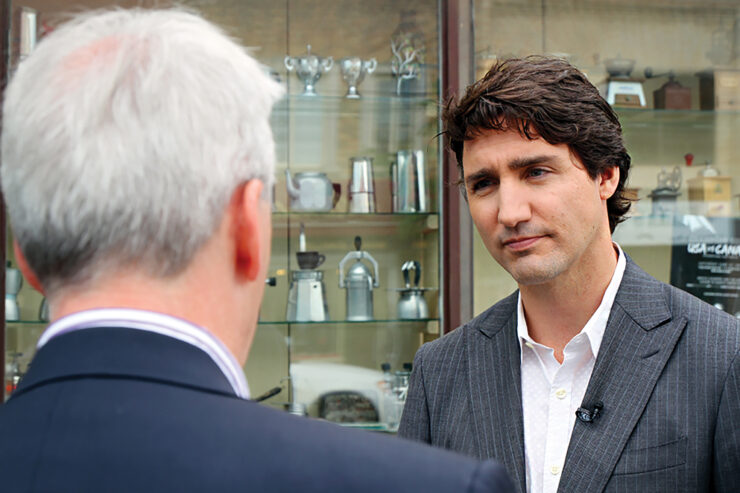Should PM push Canadian ideals or be wary of economic consequences?
Justin Trudeau was elected in Canada on the promise of embracing diversity and inclusion. On this point, and several others, Trudeau’s viewpoint stands in stark contrast to the newly elected United States president Donald Trump and his tendency towards isolationism.
So, in the wake of his first official meeting with Trump on Monday, Feb. 13, how should Trudeau tackle this diplomatic minefield going forward?
Trudeau needs to push back harder against Trump
When Donald Trump won the U.S. election in November, Prime Minister Justin Trudeau issued a statement that said he looked “forward to working very closely with President Trump.” But after Trump’s first month in office, during which he introduced legislation to carry out many of his shocking election promises, Trudeau should no longer turn a blind eye.
During his time in office, Trudeau has demonstrated over and over again that he can be eloquent. But offering an infinite amount of praise to Canada for not being like the U.S. does not take the place of real action.
Trump’s recent executive order barring U.S. travel for people from seven Muslim majority countries, as well as temporarily blocking refugee resettlement, is one of the most impactful and unexpected actions so far.
Trudeau responded to this order with a tweet: “To those fleeing persecution, terror & war, Canadians will welcome you, regardless of your faith. Diversity is our strength”.
This message sounds nice and was retweeted over 428,000 times, but it has not lead to any policy changes to date.
When asked by Thomas Mulcair during Question Period on Jan. 31 why he would not denounce the travel ban, Trudeau hid behind his concern for the economy: “We need to make sure that we are protecting Canadian jobs by having a constructive working relationship with our most important trade partner and ally.”
Of course the economy is important, but is it worth sacrificing our values in order to pander to our southern neighbour’s erratic leader?
According to the U.K. and Germany, the answer is no. German Chancellor Angela Merkel called the travel ban “in no way justified” and British Prime Minister Theresa May publicly expressed disagreement with the ban as well.
The massacre at a Quebec City mosque last month, as well as numerous reports of hate crimes happening across the country, has forced Canadians to face the fact that hatred exists here too. And when we have a prime minister who has not publicly denounced the discriminatory rhetoric growing south of the border, it contributes to the normalization of xenophobia and racism in the Great White North.
There’s a lot of opportunity for the government to act. The New Democratic Party has proposed that the government offer a home to refugees bound for the U.S., raise its 2017 cap on privately sponsored refugees, and suspend the Safe Third Country Agreement.
Canadians are known as a people who are overly polite and don’t like to offend others, but Trudeau needs to gather his courage and speak out against this bully.
The drive to define the our country’s patchwork culture is a constant challenge, but it’s arguably our diversity that unites us. We don’t have much that ties us together, and if we lose these values there won’t be much left.
As Mulcair told Trudeau during Question Period last month, “it is always the role of the Canadian Prime Minister to stand up to racism and hatred.”
Trudeau needs to fulfil this role.
—Janoah Willsie
Doing more to fight Trump would be a mistake
Soon after Donald Trump was elected President, Trudeau issued an invitation for him to visit Canada.
For many Canadians, Trump’s election alone has been enough to make them gag, and the idea of him visiting our country is nauseating. Some even feel that this goes against the principles and Canadian values that Trudeau has espoused.
Additionally, the recent shooting in Quebec has many Canadians nervous that Trump’s rhetoric may be seeping into the national consciousness. Many believe he should have been officially uninvited.
So what is the best way for Trudeau to address these concerns going forward?
Well, firstly, it’s important to note that Trudeau is dealing with approximately $541 billion in American trade, a number has been rising 4.5 per cent annually between 1993 and 2016. As cited by Global Affairs Canada, there are 3.3 million Canadian jobs tied with American trade, comparable to nine million American jobs tied with Canadian trade. There are literally millions affected by Canada’s relationship with the U.S.
The United States and Canada have an intensely interwoven relationship that far predates Trump and there is no quick fix to extricate ourselves from American ties. It’s unfortunate, but Trudeau can’t just close the door on the States altogether.
Secondly, Trudeau doesn’t get a say in American policy. Clearly, the greater issue for many isn’t the economy—it’s a clear question of human rights. Some Canadians want Trudeau to issue a strong stance that Trump’s divisive rhetoric will not be tolerated. Fair enough. After all there are legitimate reasons to fear Trump, and we need a leader who will stand up against a potential fascist.
But let’s review what’s already happened. On Jan. 28 Trudeau tweeted “To those fleeing persecution, terror & war, Canadians will welcome you, regardless of your faith. Diversity is our strength. #WelcomeToCanada.” The tweet is diplomatically worded but is unmistakably a response to Trump’s Muslim travel ban.
After Fox News falsely reported that the Quebec shooting was done by a Moroccan, they publicly apologized and deleted the report after Trudeau’s office issued an overtly furious letter.
“These tweets dishonour … the memory of the six victims by spreading misinformation, playing identity politics, and perpetuating fear and division within our communities.”
Through actions like this, Trudeau has not been silent in the face of recent events. He has made Canada’s position globally known and in direct opposition to Trump’s fear-mongering politics.
The unfortunate truth is that as long as Trump has a passport, he can visit Canada. In the meantime, Trudeau can only manage Canadian interests. It is his responsibility to maintain our values through his own actions, not Trump’s. It’s also his responsibility to ensure we remain strong as a country economically.
The prime minister may be dreading the idea of shaking Trump’s short-fingered hand, but you’d have to be a fool to swat at a nesting eagle without an end game.
And Reuters may have scored the still of the day. #TrudeauMeetsTrump pic.twitter.com/yLok2wd1LZ
— Mike Gibbs (@Mikeggibbs) February 13, 2017
—Erica Endemann





